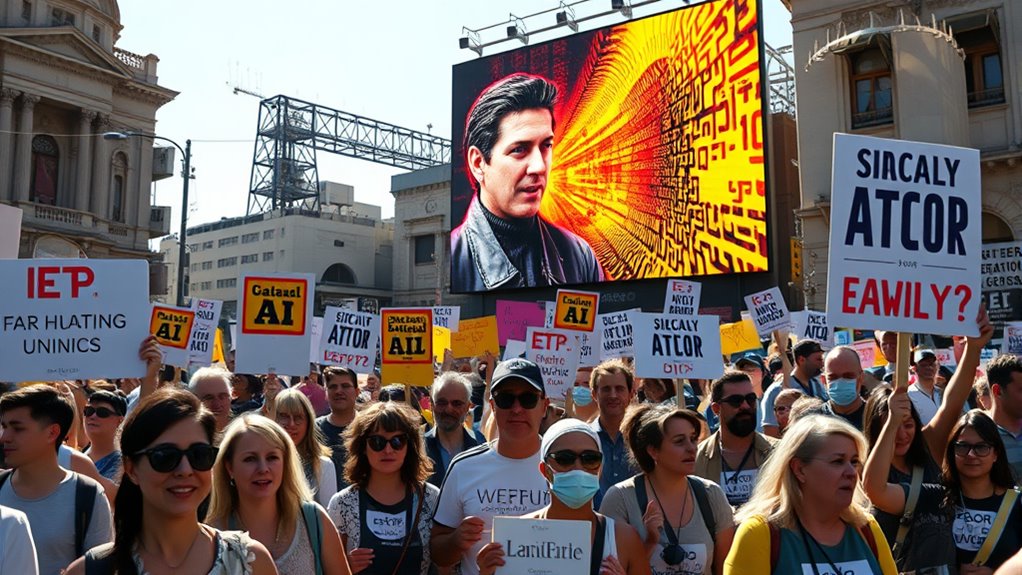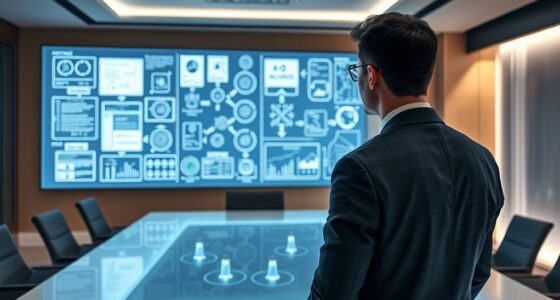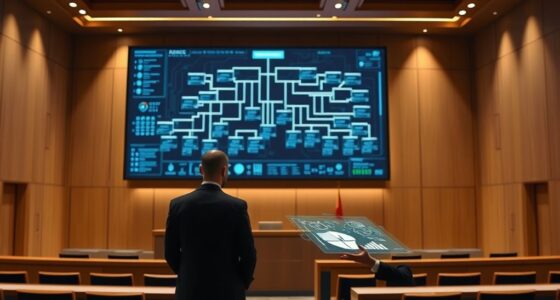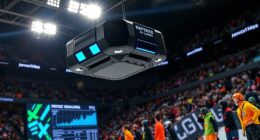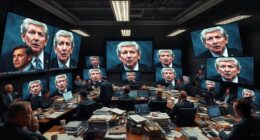Hollywood unions are urging lawmakers to regulate AI cloning technology to protect actors’ rights. They worry that AI can create realistic digital replicas of faces and voices without permission, risking exploitation and damage to careers. Without clear rules, actors face unauthorized use of their likenesses, which can harm reputations and bypass fair pay. If you want to understand how regulations could impact the industry and your favorite actors, keep exploring the details.
Key Takeaways
- Hollywood unions advocate for laws to regulate AI cloning, protecting actors’ rights and preventing unauthorized use of their likenesses.
- Legislation is needed to address ethical concerns, consent, and authenticity issues associated with AI-generated actor replicas.
- Unregulated AI cloning risks exploitation, defamation, and misuse, undermining performers’ control over their images and performances.
- Actors seek legal protections to ensure proper compensation and prevent indefinite reproduction of their performances via AI.
- Implementing clear regulations will help safeguard intellectual property rights and maintain trust within the entertainment industry.
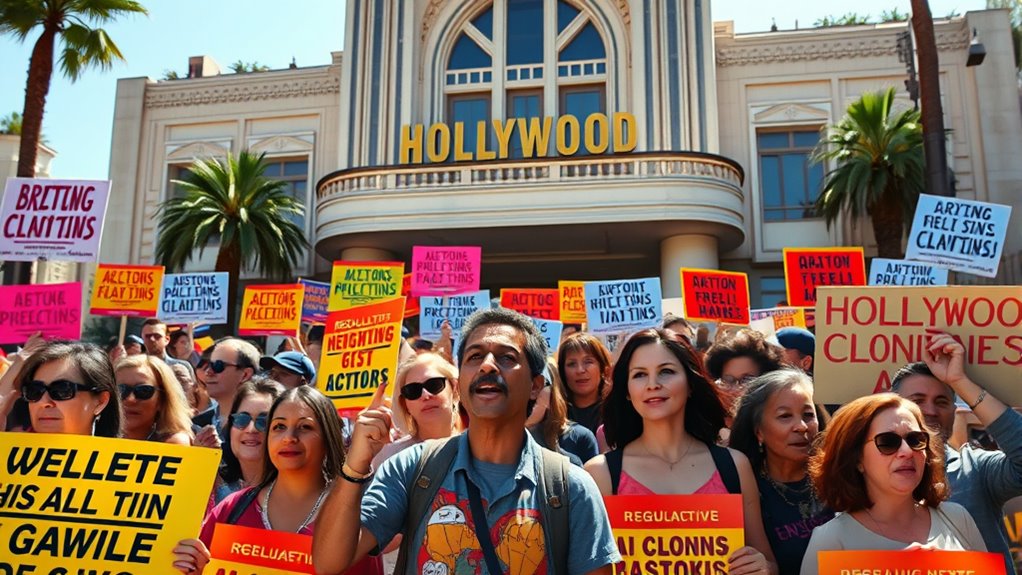
Hollywood unions are urging lawmakers to establish regulations on AI cloning technology, arguing that without oversight, actors’ rights and livelihoods could be at serious risk. As AI advances, it becomes easier to create highly realistic digital replicas of actors’ faces and voices, raising urgent questions about deepfake ethics. You need to understand that deepfake technology isn’t just about entertainment; it touches on fundamental issues of consent, authenticity, and control. When studios or malicious actors generate unauthorized AI clones, it can lead to unauthorized use of an actor’s likeness, potentially damaging their reputation or career. This creates a gray area where actors might find their images manipulated without permission, blurring the lines of intellectual property rights. Without clear regulations, studios could exploit AI to reproduce performances indefinitely, circumventing traditional contracts and payment structures. This threatens to devalue actors’ performances and undermine their ability to control how their image is used. Additionally, the lack of comprehensive payment protection laws leaves performers vulnerable to exploitation as AI technology becomes more integrated into media production. You might not realize how complex the ethical landscape really is. Deepfake ethics involve balancing technological innovation with respect for individual rights. When AI clones are used without proper safeguards, it can lead to exploitation, misrepresentation, and even defamation. Actors, who invest their time, talent, and reputation into their work, deserve legal protections that prevent their likenesses from being misused or exploited. Without regulations, there’s a risk that AI-generated clones could be employed to produce content that actors would never endorse, eroding trust in the industry. Moreover, the intellectual property rights associated with an actor’s image are often poorly defined in current laws. This lack of clarity leaves performers vulnerable to unauthorized reproduction and commercial use of their likenesses, especially as AI tools become more sophisticated.
Frequently Asked Questions
How Would AI Cloning Impact Actors’ Long-Term Employment Prospects?
AI cloning could threaten your long-term employment prospects by making it easier for studios to use digital replicas instead of hiring actors. This raises important questions about intellectual property rights, as your likeness might be used without proper consent or compensation. Ethical considerations also come into play, as you might be replaced or devalued, leading to job insecurity and a need for stronger protections to guarantee fair treatment and creative control.
What Specific Legal Rights Would Actors Retain Over Their AI Clones?
You’d want your actor rights protected, especially over AI clones. Legally, you’d retain control over your image, voice, and likeness, ensuring cloning consent is explicitly given. Laws would prevent unauthorized cloning and usage, giving you the power to revoke or limit your AI clone’s activities. Think of it as guarding your brand—your rights should be clear, firm, and enforceable to keep your creative legacy intact.
Could AI Cloning Be Used Without Actors’ Consent in Future Projects?
Yes, AI cloning could be used without actors’ consent in future projects, raising serious ethical concerns and consent issues. Without proper regulation, studios might exploit AI technology to recreate actors’ likenesses without approval, potentially infringing on their rights and autonomy. This misuse highlights the urgent need for clear laws protecting actors from unauthorized AI reproductions, ensuring their consent remains central to any utilization of their digital likenesses.
How Might AI Cloning Influence the Diversity of Roles in Hollywood?
AI cloning could limit role diversity in Hollywood, with around 60% of studios favoring familiar faces over new talent. This shift may hinder creative innovation and challenge AI ethics, raising concerns about representation and inclusivity. As AI technology advances, you might notice fewer opportunities for diverse actors, making it vital for industry regulations that balance innovation with ethical standards. Embrace policies that promote authentic storytelling and broad representation in film.
What Technological Safeguards Are Proposed to Prevent Misuse of AI Clones?
You’re likely to see proposals for technological safeguards like data encryption and access controls to prevent misuse of AI clones. These measures guarantee only authorized individuals can access or modify the clones, protecting actors’ rights and preventing unauthorized replication. By implementing these safeguards, you help create a secure environment where AI cloning is used responsibly, maintaining ethical standards and reducing the risk of exploitation or misuse of digital likenesses.
Conclusion
As you witness Hollywood unions fighting tirelessly to regulate AI cloning, it’s clear they’re defending the soul of acting itself. Without safeguards, the industry risks losing its human touch to soulless digital replicas—an erosion of artistry that could be felt for generations. Your support and awareness can help guarantee the magic of genuine performance survives this technological storm, preserving the heart and spirit of Hollywood for countless future fans and actors alike.

